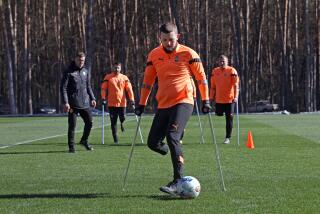Words of War : Safe in O.C. After Losing His Legs in Bosnia, Soldier Refugee Won’t Give Up the Fight
- Share via
ANAHEIM — Every morning, Shemsudin Sushich wakes up, puts on his carbon graphite legs and hobbles off to fight the Bosnian war.
He’s in Anaheim, 7,000 miles from the fighting, but it’s only a short walk to his personal battlefield--the desk in his bedroom where he tries to defend his nation with pen and typewriter.
His first manuscript, “Hell in the Garden of Angels,” a collection of Bosnian war stories including his own, is making the rounds of publishers in New York. No surprise to those who know Sushich, his second will be about the war, too. Perhaps his third, fourth and fifth as well. Thoughts of the war consume him.
He watches television, but only news broadcasts to hear the latest from Bosnia.
He visits a park near his Anaheim apartment, and it reminds him of Bosnia. “Bosnia is full of green hills, but after the war started, I never got a chance to sit on grass until I came to this country.”
He strolls outside his apartment building, and encountering neighbors reminds him that he must tell all about the plight of his people.
“People in concentration camps. They rape our wives, our sisters. They destroyed our towns and are trying to destroy our culture. We are so depressed about the war. . . . It’s a damn terrible situation.”
He looks at his substitute legs propped against a chair and they remind him of the need to fight--and that he no longer can.
“We hadn’t any choice but to defend ourselves,” says Sushich, 25.
“We lost everything overnight,” says wife Amela, 24, who supports them by working at a Target store in Anaheim.
“What happened to them totally changed their lives,” says Anna Forgiarini of Huntington Beach, a Croatian immigrant who befriended the couple. That they retain any optimism is amazing, she says.
The couple met and became engaged while studying chemical engineering at Tuzla University in Bosnia. But in 1992, a year before they were to graduate and begin careers in local chemical factories, the war broke out, and “ethnic cleansing” began.
“My parents lost everything in Zvornik and now are in a refugee camp in Tuzla,” says Shemsudin Sushich. “Because of that, I decided to volunteer in the fight.” He joined the Bosnian Muslim army.
Amela Sushich volunteered as a nurse. She was helping staff a makeshift emergency room near the village of Sapna when an artillery shell exploded just outside, mangling the legs of a Muslim soldier--her fiance. Within days, his legs were amputated.
The couple spent a year in a refugee camp in Slovenia, but nine months ago they arrived in Orange County, the first refugees sponsored by the locally based American Bosnia-Herzegovina Assn. to obtain permanent residency in the United States. Mufid Sokolovich of Costa Mesa, president and founder of the association, says he sponsored the couple to allow Shemsudin to get medical attention.
Now Shemsudin Sushich has received the latest in prosthetic legs and undergoes physical therapy each week.
His physician, Bill Conklin, says he is impressed with the couple’s outlook and optimism. “You can tell from speaking to them that they’ve accepted Shemsudin’s physical condition totally and they’re . . . trying to make some good come out of their experience in the war.”
The optimism often sounds like certainty.
“Bosnia will never fall,” Shemsudin Sushich says. “We will fight to the end. We will never be defeated.”
Peace proposals that include dividing Bosnia “will never, never work out,” he says. “Bosnia simply cannot be divided. We need to live together--the Croats, the Serbs and the Bosnian people--without any form of ethnic cleansing. We must live together and give everyone the same rights. Otherwise, we will always fight.”
“It can be done,” Amela Sushich says. “Look at America. What is amazing to us is there are a lot of different kinds of people here living together without national politics tearing them apart. I believe victory is on our side.” Bosnia will win the war and restore peace and happiness throughout the devastated land, she says.
But the couple concede there is also uncertainty about what lies ahead.
They are studying for entrance examinations, hoping to qualify for admission to Cal State Fullerton, where they want to resume their engineering studies.
“Our plan is to finish our education here,” Shemsudin Sushich says. “We are hurt by what the war has done to Bosnia, and we need time to (heal) and finish school before we decide what our next step will be.
“We want to do something for ourselves now, and then see how the situation is in Bosnia to decide whether to stay here or go back.”
More to Read
Sign up for Essential California
The most important California stories and recommendations in your inbox every morning.
You may occasionally receive promotional content from the Los Angeles Times.













